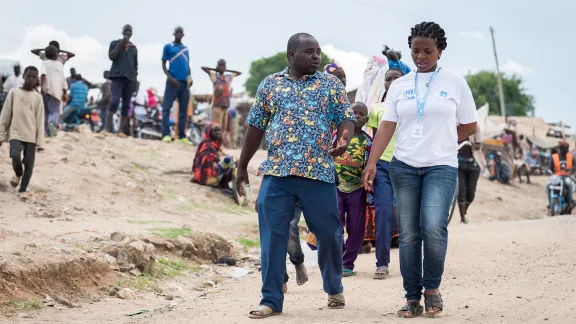
Working together, for people in need: LWF and UNHCR staff in Cameroon. Photo: LWF/ Albin Hillert
Webinar on Global Compact for Refugees highlights role of faith-based organizations
(LWI) - Faith-based organizations (FBOs) play a crucial role in promoting refugee rights and making their voices heard. By being able to engage with the humanitarian system, as well as faith communities on the ground, they provide a much-needed link. Faith-based organizations can therefore easily relate to communities who are often first responders, and a highly developed system of humanitarian aid, said Maria Immonen, director of the LWF’s diaconal arm, World Service.
In a webinar on “The global compact for refugees and the role of faith-based organizations”, representatives from the German and Italian government, as well as LWF’s partner Islamic Relief Worldwide, discussed the possible role of faith-based organizations in the Global Compact for Refugees.
First responders
“Where refugees are concerned, it is often the local faith communities, the churches, the mosques, the temples, who are the first responders,” said Atallah FitzGibbon, Faith and Partnerships Advisor, Islamic Relief Worldwide IRW). They “provide food and shelter, protection, and continue with important services like refugee integration and acceptance. Faith actors provide a community, where other institutions provide institutional help,” he concluded.
The “crucial role” of faith communities, in integrating refugees into their new host communities, was widely recognized by all panelists. Pit Köhler, Head of Division for Multilateral Policy on Humanitarian Assistance in the Federal Foreign Office of Germany cited the engagement of diaconal organizations in resettlement programs which are based on private sponsorship. Germany was a co-convener of the Global Refugee Forum 2019 in Geneva, and has followed a multi-stakeholder approach, Köhler said. ”The positive impact of faith communities and faith-based organizations in fostering respect and understanding in host societies cannot be underlined enough.”
Francesco Luciani, Head of Unit, Migration and Forced Displacement, Directorate-General for International Partnerships mentioned the engagement of Lutheran and Catholic communities, especially in Southern Italy. The close connection to the communities helps identify people in need and make sure that relief goods are distributed accordingly. “There is a determination and capacity that you don't easily find in other organizations,” Luciani said. “The strong values and principles (of FBO) also provide an insurance.”
Different approaches set up barriers
While united by a common cause, however, faith communities and the humanitarian system face barriers when working together. Different approaches, systems, and terminology pose challenges to closer cooperation, explained IRW advisor FitzGibbon. “We are speaking different languages. Faith communities do sometimes not understand the legal context. On the side of humanitarian actors, there are concerns about proselytization, impartiality or a lack of compliance.”
In this situation, faith-based organizations such as LWF and IRW play an important role, LWF’s Immonen pointed out. “We can engage with the humanitarian system because we speak the language,” Immonen said. “But we also speak the language of faith communities.” She called for more and long-term resources to train local faith communities and support them in their important role.
Let refugees speak for themselves
The knowledge of both systems also means these FBOs are in a unique position to advocate with national and international human rights mechanisms, making sure the rights of refugees are taken into account. She cited the LWF Local-to-Global approach and engagement with the Universal Periodic Review of the UN Human Rights Council. LWF regularly submits parallel reports and brings delegations from the communities in its humanitarian and development programs, to explain their situation on an international stage.
“The voices we bring to the table to witness to the abuses and to the exclusion need to be the people themselves,” Immonen said. “This in itself is empowering.”
LWF/ C. Kästner
The webinar is one of several meetings leading up to the "Welcoming the Stranger, Shaping the Future" international conference planned for 2022. This is an initiative that was jointly pledged by Islamic Relief Worldwide and the Lutheran World Federation at the Global Refugee Forum in 2019.


